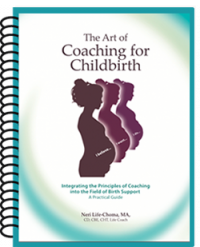
Transformational Postpartum Coaching: Promoting New Parents’ Self-Confidence and Well-Being
Just like prenatal coaching, transformational postpartum coaching shifts the focus from helping or informing to elevating new-parents’ performance level, self-confidence, and well-being.
Most of my writing has been dedicated to pregnancy and childbirth support. During the pandemic, I’ve been thinking a lot about the challenges of new parents or parents who have expanded their family recently. I want to share how transformational coaching during the parents’ postpartum period can enhance their experience.
The postpartum period is a challenging time for parents even during normal circumstances when family and friends can come over and assist. These days, parents are adjusting to their new arrival and the arrival of a global pandemic. They are adjusting to a ‘new normal’: wearing masks, social distancing, closed schools, working from home, and alike.
Coping with Postpartum Emotional Challenges During the Pandemic
These lifestyle changes don’t even begin to reflect on the extreme change in our mindset: our day-to-day stability gives way to the unknown. Our near and far plans give way to survival instincts. Our freedom and physical touch are replaced by shelter-in-place and social distancing. It is overwhelming to cope with postpartum or first-time parenting challenges when the world as we know it is off balance and experiencing so much loss. This can trigger fear. It can sabotage new-parents’ well-being and self-realization.
Coaching shifts the focus from helping or informing to elevating new-parents’ performance level- their self-confidence and well-being.
How Can Transformational Postpartum Coaching Help?
Just like prenatal coaching, transformational postpartum coaching shifts the focus from helping or informing to elevating new-parents’ performance level, self-confidence, and well-being. This is the overall goal of coaching throughout postpartum. The way I see it, you can help them with practical tasks and be the helper. But you can also coach them so that they will be better equipped to handle challenging parenting periods in their lives. You can facilitate a positive experience. Now that we have clarified the goal of the process, we can follow the next basic steps of the postpartum coaching process.
Step #1: Conducting a reality check
The reality check answers the question: how is the new parent doing right now? To clarify your clients’ situation or reality, you can use the NURSE acronym. I came across this acronym when reading Beyond the Blues by Bennett and Indman. In this acronym, the N stands for Nourishment, the U stands for Understanding, the R is for rest, the S for Spirituality – joy, soul hobbies, and the E stands for Exercise. These are important areas of functioning that new parents tend to neglect while prioritizing their offsprings’ or partner’s needs.
Use the NURSE acronym to map their challanges and begin to coach!
Begin by asking questions around these areas:
N– What actions are you taking to make sure you are well-nourished?
U– Do you feel confident with handling the day to day parental tasks? Are comfortable with your emotions and internal conversations? Do you have someone who reassures you and understands you when it’s needed?
R– When and for how long are you resting or recharging in 24 hours?
S– Which activities do you engage in that brings you joy or nourish your soul?
E- Do you find the time to exercise? How often and for how long?
When you ask these questions, your most important roles are to practice active listening, be curious about your client’s experience, and avoid any judgments. Just by listening to themselves addressing these areas opens up so much potential for improvement.
Step #2: Exploring new parents’ options
The next step is for you and your client is to explore what needs to change for them to increase their comfort or performance level in each of the domains that the NURSE acronym represents. Explore their options by allowing them the time to search within for what is missing right now and discover which actions they can take. Or maybe search for activities they once enjoyed and can re-engage in.
Set up tangible goals and specify at what time and for how long to engage in actions
Step #3: Eliciting parents’ accountability
Set up a call for action to help the new parent be accountable for their healthy postpartum period. You may do that by exploring the best time of the day for this particular individual to engage in their chosen activities or the number of actions they will engage in per week. Make it as tangible as possible by deciding on how long they will engage in each activity. Your client needs to feel a sense of relief and joy when they say “For the next week, I will engage in an X number of activities from this list, for a Y number of times and ‘so&so’ minutes each time”. You can then decide on a check-in call or text messaging with your client during the time between your meetings.
We have gone through the full circle of the coaching process in this article. We clarified the goal of the coaching process, we conducted a reality check to see where our client is at right now, we explored options which will help them function and feel better. Additionally, we motivated them and helped them be accountable and take charge of their experience. If leading the coaching process excites you and feels like a valuable contribution to your postpartum practice, check out the Birth Coach Method’s programs. We teach a new set of coaching practices and principles and their application to birth support and beyond.
- Overshadowing the Transformative Essence of Childbirth with Data - July 10, 2024
- Navigating the Epidural Dilemma - May 28, 2024
- Informed Decision in Birth Support: A Myth of Empowerment? - April 29, 2024


